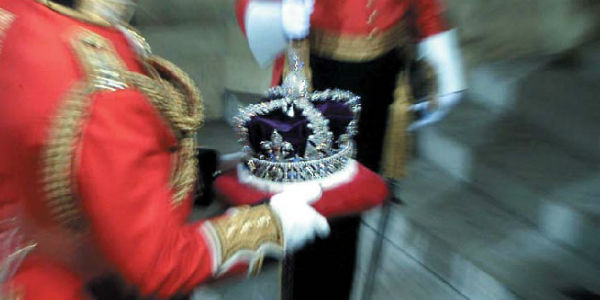‘Citizen of the world’? Think again: British citizenship after Brexit
National identity is fundamental to citizenship, Theresa May told Conservatives in October, and self-styled ‘citizens of the world’ are deluding themselves. Matthew Grant traces how British citizenship has been endlessly redefined for political purposes since the second world war – first becoming associated with whiteness, and now with the non-European. The scope of what constitutes ‘belonging’ is shrinking.

The Crown at the State Opening of Parliament.Photo: UK Parliament via parliamentary copyright
In her speech to the Conservative Party conference in October this year, Theresa May declared that ‘if you believe you’re a citizen of the world, you’re a citizen of nowhere’. In the febrile atmosphere of post-referendum Britain, this statement caused consternation. Here was a top level political rejection of the values of internationalism to go alongside the public’s rejection of the European model. For many, and not just those on the left, this seemed to discount the feelings of compassion and connection that came from considering oneself a global citizen. Instead, May was declaring that citizenship was something narrower and smaller, based on British provincialism, and allying herself with the anti-immigration rhetoric which featured so heavily in the Leave campaign prior to the referendum.
If we place May’s statement back into context, we can see that it was part of a broader attack on the disconnect between the actions of the wealthy and the need to ‘respect the bonds and obligations that make our society work’. She attacked those ‘people in positions of power’, who ‘behave as though they have more in common with international elites than with the people down the road, the people they employ, the people they pass in the street’. It was these people she meant when she said ‘if you believe you’re a citizen of the world, you’re a citizen of nowhere’ – adding to those who believed this: ‘You don’t understand what the very word “citizenship” means’.
For her, the ‘spirit of citizenship’ is a way to create a sense of unified purpose in the nation, a nation ‘built on the bonds of family, community, citizenship’. But this is a concept of citizenship based on the logic of anti-immigration. For the rich, citizenship ‘means recognising the social contract that says you train up local young people before you take on cheap labour from overseas’. The beneficiaries of this action, for May, should be the people ‘out of work or on lower wages because of low-skilled immigration’: for these people, ‘life simply doesn’t seem fair’, and they feel as though their ‘dreams have been sacrificed in the service of others’.
British ideas of citizenship are extremely diffuse
May’s vision of citizenship is based on contractarian notions of obligations as well as rights – in this sense the obligations of the rich and the rights of the excluded. In articulating citizenship in this way, May was confident that she, unlike the wealthy, understood the true meaning of citizenship. But her rhetoric was also proof that the meaning of citizenship can be endlessly redefined for political purposes. This is possible because in Britain ideas of citizenship are extremely diffuse, and have been throughout the period since the second world war. The sociologist Ruth Lister, now a peer, has noted that understandings of citizenship are so fragmented that the concept ‘runs the danger of meaning what people choose it to mean’.[1]
But if we carefully unpick the main ways citizenship has been discussed in modern British history, we find that there are in fact three main ways in which ‘citizenship’ is used and defined. First, citizenship is seen as a narrowly politico-legal framework, making up the legal, political, and social rights of the population, but also the obligations expected in return. Secondly, citizenship is conceived as resulting from a sense of ‘belonging’ to a constructed national community, with belonging a key marker of, or barrier to, citizenship status. Thirdly, there is a focus on what we can call differentiated aspects of citizenship, particularly on the idea that ‘good citizens’ are those who participate more within society, with a particular emphasis on voluntary action or ‘engagement’. I call these the three registers of citizenship.[2]
The legal rights of citizens in the United Kingdom expanded during the 20th century. For those with the status of legal citizens, not only increased voting rights (for women most obviously, but also for working class men), but also increased social rights (access to the welfare state), have transformed the relationship between the state and the people. But the boundaries of legal citizenship have also been more sharply drawn, most obviously when the right to reside and work in the UK was withdrawn from British passport holders born in Commonwealth countries under the 1962 Commonwealth Immigrants Act.
Underpinning such legislative change was the shift towards understanding citizenship as a category of belonging, and within this register British citizenship was increasingly racialised and associated with whiteness from the late 1950s: in this sense, non-white people born in the Commonwealth were perceived as not ‘belonging’, and not ‘really’ British. For black British citizens, this racialised notion of belonging manifested itself in their experience of the racism endemic in British society and culture in the third quarter of the 20th century. Immigration, whiteness, and citizenship were intertwined in ways that effectively excluded many Britons who possessed the status of citizens from practising their citizenship in its fullest sense.[3]
If Britons are not European, what appeal can formal British citizenship have to those Europeans who have called Britain home?
Theresa May’s criticism of the ‘citizens of nowhere’ continues this process of aligning Britishness with a partial and exclusive vision of belonging. She portrays citizenship as a national community from which the ‘low-skilled’ immigrant is pointedly excluded. This is why her rhetoric matters: for many, her explicit rejection of an international outlook confirms that Britain is no longer open or welcoming to those born outside its shores. For the same reason, the government’s suggestion that European citizens apply for formal leave to remain, or for British citizenship, rather misses the point. If British citizenship is to be defined in such a way that Europeans are so visibly excluded and categorised as not belonging, what appeal can formal British citizenship have to those Europeans who have called Britain home?
Citizenship means more than a simple legal framework, as May knows. It is about values and belonging, and no one source of authority can control what is valued in Britain. For many Remain campaigners, notions of Britishness and belonging were rather more elastic than what is on the cover of an individual’s passport. Pro-Leave campaigners, however, concentrated on the rights of those whose passports featured the lion and the unicorn. In post-referendum Britain, the shrinking sense of belonging is palpable. As the history of debates on citizenship shows, when an individual, group or community is no longer considered to belong, attacks on their rights, their position, and their bodies soon follow.
Notes
[1] Ruth Lister, Citizenship: feminist perspectives (2nd edn, Basingstoke,2003), p. 13.
[2] Matthew Grant, ‘Historicizing Citizenship in Post-War Britain’, Historical Journal, 59:4 (2016), pp.1187-1206.
[3] See, in particular, Bill Schwarz, The white man’s world (Oxford, 2011); and Kennetta Hammond Perry, London is the place for me: Black Britons, citizenship, and the politics of race (Oxford, 2016).
This post represents the views of the author and not those of Democratic Audit.
 Matthew Grant (@mgrnt) is Reader in Modern British History at the University of Essex. Listen to him discuss Cold War politics at the LSE.
Matthew Grant (@mgrnt) is Reader in Modern British History at the University of Essex. Listen to him discuss Cold War politics at the LSE.





 Democratic Audit's core funding is provided by the Joseph Rowntree Charitable Trust. Additional funding is provided by the London School of Economics.
Democratic Audit's core funding is provided by the Joseph Rowntree Charitable Trust. Additional funding is provided by the London School of Economics.
‘Citizen of nowhere’: @mrgnt on Theresa May’s attack on self-styled ‘citizens of the world’ https://t.co/tiD4fzAJj1
‘Citizen of the world’? Think again: British citizenship after Brexit https://t.co/FhOjayxjEO
ICYMI: ‘Citizens of the world?’ British citizenship after the referendum…
https://t.co/3wfthAyC2j
https://t.co/6bBNJqVF15 #brexit
Matthew Grant traces how British #citizenship has been endlessly redefined for #political purposes: https://t.co/N5lkBPSPDE #WorldCitizen
‘Citizen of the world’? Think again: British citizenship after Brexit https://t.co/39WPlsYs6C
‘Citizen of the world’? Think again: British citizenship after Brexit https://t.co/fn5ce5qPMs
‘Citizen of the world’? Think again: British citizenship after Brexit https://t.co/coH6t3fX1v
‘Citizen of the world’? Think again: British citizenship after Brexit via @democraticaudit
#Brexit
https://t.co/oQeekM0bxT
‘Citizen of the world’? Think again: British citizenship after Brexit https://t.co/JY9Z6sXY06
‘Citizen of the world’? Think again: British citizenship after Clusterfuck https://t.co/FHfCynF0O2
‘Citizen of the world’? Think again: British citizenship after Brexit https://t.co/Ud6bdsMKi9
‘Citizen of the world’? Think again: British citizenship after Brexit https://t.co/tiD4fzSkaz https://t.co/JGIgv3aotK
Worth a read “@democraticaudit: ‘Citizen of the world’? British citizenship after Brexit https://t.co/KsvLn8d3cb https://t.co/tIcT4Wlvxp“